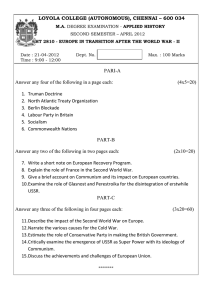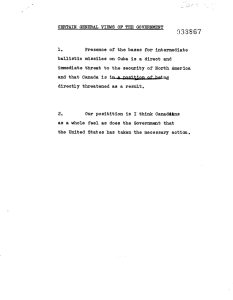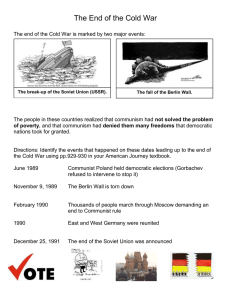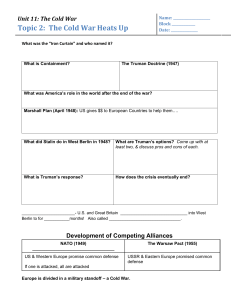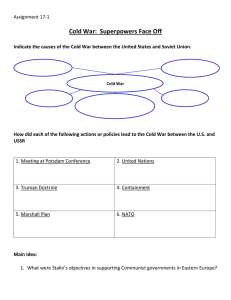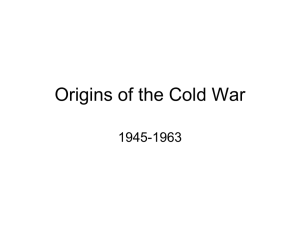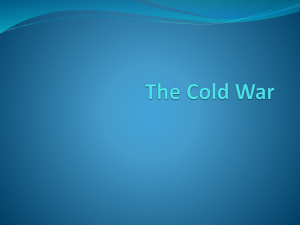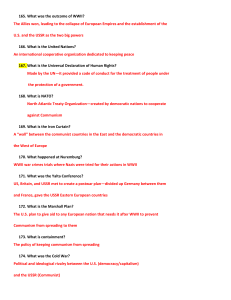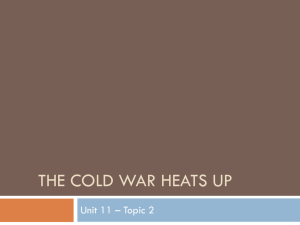The Cold War: 1945-1989 Name __________________________ The Cold War Begins!
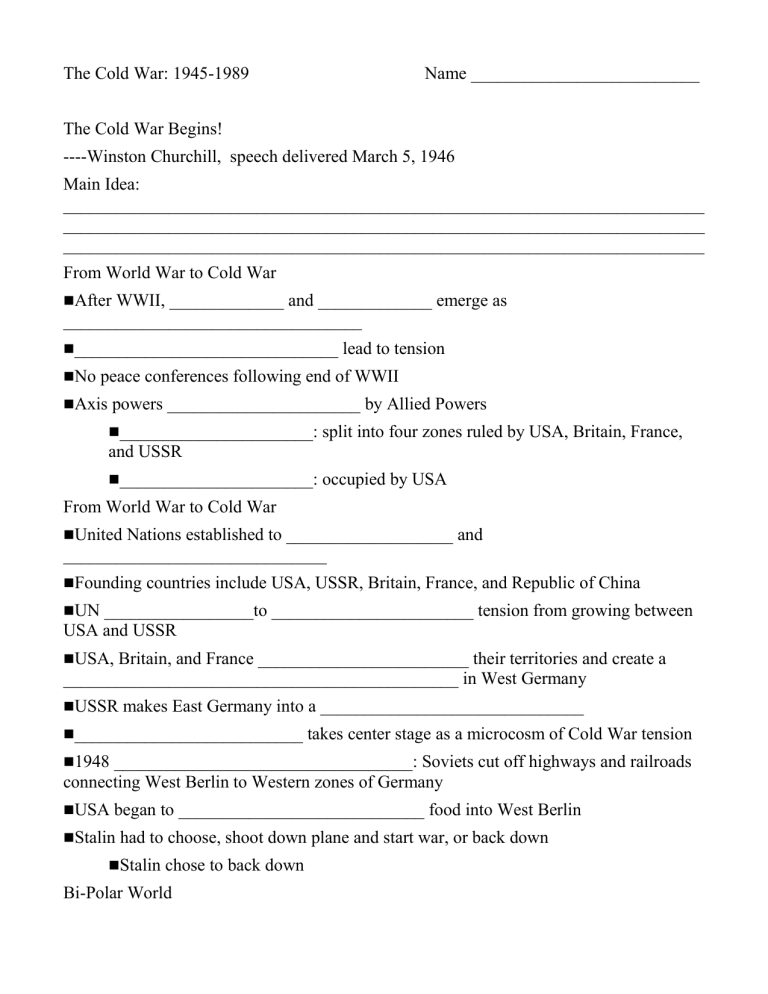
The Cold War: 1945-1989 Name __________________________
The Cold War Begins!
----Winston Churchill, speech delivered March 5, 1946
Main Idea:
_________________________________________________________________________
_________________________________________________________________________
_________________________________________________________________________
From World War to Cold War
After WWII, _____________ and _____________ emerge as
__________________________________
______________________________ lead to tension
No peace conferences following end of WWII
Axis powers ______________________ by Allied Powers
______________________: split into four zones ruled by USA, Britain, France, and USSR
______________________: occupied by USA
From World War to Cold War
United Nations established to ___________________ and
______________________________
Founding countries include USA, USSR, Britain, France, and Republic of China
UN _________________to _______________________ tension from growing between
USA and USSR
USA, Britain, and France ________________________ their territories and create a
_____________________________________________ in West Germany
USSR makes East Germany into a ______________________________
__________________________ takes center stage as a microcosm of Cold War tension
1948 __________________________________: Soviets cut off highways and railroads connecting West Berlin to Western zones of Germany
USA began to ____________________________ food into West Berlin
Stalin had to choose, shoot down plane and start war, or back down
Stalin chose to back down
Bi-Polar World
The World quickly ___________________ between
Those who support the USA (_______________________________)
Those who support the USSR (_______________________________)
Those who hope to stay neutral and receive benefits from both
(__________________________)
Cold War Policies
1947 Truman
Doctrine_________________________________________________________________
1947 Marshall Plan
___________________________________________________________________
1949 creation of _____________
Goals: Containment of Communism
Reaction to NATO
USSR creates ____________________________
Soviet imposed military alliance controlled by USSR
Line between east and west called “__________________________” by Winston
Churchill.
Neither _______________________________, nor Eastern refugees could penetrate this imaginary line
Nonaligned Nations
______________________, most of Africa, the Muslim world, and parts of Central and
South America
The Space Race:
_______________________________________________________________________
Arms Race:
_________________________________________________________________________
__
Communism in China
1949 ___________________________ pushes Guomindang into exile in Taiwan, establishes People’s Republic of China
China becomes worlds ______________________________ communist nation
Today Taiwan rejects China’s attempts at unification
Mao = ____________________________________
Mao’s Great Leap Forward
1950s
Plan to create a truly communist _____________________________ economy
_________________________ of farming and industry
Miserable failure, some call it the Great Leap _________________________________
Caused famine, ____________________________ died
Focuses on building _________________________________
Tests first ___________________________ in 1964
Introduces some elements of __________________, then worries about straying from communist past
The Cultural Revolution
1960s
Goals: __________________________ and traditional, create a new society based on communist values
_______________________: Red Guards run amuck, students kill teachers, medical students imprison doctors, many arrested and executed for being “counter revolutionary”
I’ll have capitalism, hold the democracy!
_________________________________________ takes control of China in 1976
Adds elements of ______________________________ into economy
Similar to Lenin’s
____________________________________________________________
Remains politically communist, limiting freedoms.
1989 ______________________________________ Massacre
Will democratic reforms ever take place?
Change Over Time
Under the communists China has
Moved away from ________________________________
Banned ________________________
Eliminated the landlord class
Granted political and legal _______________________ to women
Created laws limiting families to ________ child only
Created a true ________________________ economy
Added _______________________ of capitalism into the economy
Begun building one of the world’s _____________________________________ economies
Berlin
In 1961 Soviets built the _______________________________________surrounding
West Berlin
The fall of the Berlin wall in December 1989 signified the
____________________________________ and the fall of the USSR
Germany After the Cold War
Decline of Soviet Bloc leads directly to ________________________________
Berlin Wall torn down in _____________
__________________________ of people out of East Germany
Today Germany struggles with _____________________ and economic issues associated with rejoining the economically poor East Germany into West Germany
Korea: Cold War Heats Up!
After Japan defeated in WWII, __________ and ________________ come to occupy
Korea
Like in Germany they will not work together
Two ________________________ governments established
Communist dictatorship in ____________________ Korea
_____________________ in South Korea
Both superpowers withdraw troops in _______________
North Korea invades ____________________ in late 1949
_________ and _______________________ troops help South Korea
_________________________ helps communist North Korea
Armistice: 1953 divides Korea along 38 th parallel
Still tension between these two nations
Vietnam: More Cold War Tension Erupts!
__________________________ loses control of Indochina in 1954
Ho Chi Minh (____________________________) takes control of North Vietnam
___________________________ and France try to stop spread of communism
___________________________
Vietnam is __________________________country today
Major loss for USA
Cuba: Communism Next Door!
Cuba gains independence following
______________________________________________ in 1898
USA supports _______________________________ and supports policies benefiting wealthy landlords
1956 ___________________________ leads peasant revolt
1961 Castro sets up ______________________________ dictatorship
1961 Castro seizes industry and natural resources and
______________________________ them
1961 ________________________________ invasion
1962 US spy planes photograph Soviet missile silos in Cuba
_______________________________________________________________________
____________
Ends on October 28 after 13 days on the brink of nuclear war
USSR promises to remove nukes
USA promises not to invade Cuba
The End of the Cold War
Living standards in Western Europe ______________________________ drastically
Eastern European states begin to ______________________ against Russia
Demand _______________________
___________________________________________________
___________________________________________________
Poland
__________________________________________ leads Solidarity movement against
USSR 1980s
Polish gov’t _________________________________ Walesa
1989 Solidarity ______________________________
1989 ____________________________ torn down
1990 ____________________________ of USSR
1990 Poland gains __________________________________________, Lech Walesa elected President
USSR Collapses!
Long history of economic _________________________________ and a shortage of consumer goods
1970s USSR invades _______________________________
USA equips the Mujahadeen (__________________________) in a guerilla war against
USSR
War is politically and economically ________________________
____________________________ takes power 1985
Institutes two new policies
Glasnost (_________________________)
______________________ (restructuring)
Plans meet with _________________________________ in Russia
USA continues to push _____________________ and ________________________ races
Economic and political _______________________________ lead to USSR’s fall.
